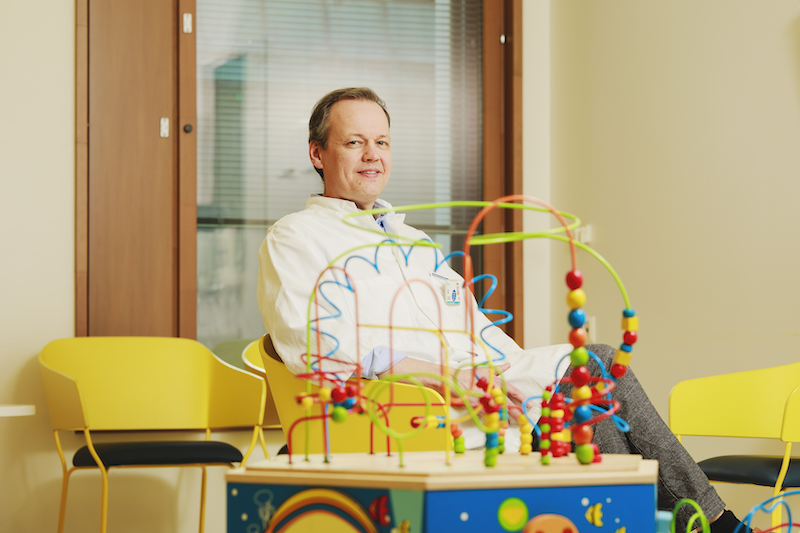In children’s special care, a huge amount of patient data is collected, on the basis of which clinicians develop better and better treatment for small patients. In pediatrician Matti Hero’s vision, data scientists and nursing staff work seamlessly together.
In the clinical research unit of the new children’s hospital, ignorance is not a bliss – quite the opposite. Since the beginning of 2023, the unit (Clinical Trial Unit or CTU) has focused even more strongly on the development of specialized medical care for children based on patient data.
“The child has the right to evidence-based and effective treatment and researched medicines. All research done on children should help the children themselves,” explains Matti Hero, senior physician at the New Children’s Hospital, who heads the clinical research unit.

Patient data is mainly collected in HUS’s DataPool, and biological samples are collected in the Helsinki Biobank. The information they contain is available to researchers.
Blood samples from all HUS patients who have given consent are collected in the biobank for future research needs, which have not yet been determined when the sample is taken. They can be, for example, the development of more effective treatments and more precise research methods. A biobank sample is taken together with other samples – so the small subject is not pricked with a needle any more than is necessary. Giving a sample requires consent from the child’s guardian and additional consent from the child himself if he is over 12 years old.
In the DataPool, on the other hand, patient register information swims in bits and pieces: for example, diagnoses, medications prescribed to patients and laboratory results.
The amount and possibilities of patient data make the clinician silent
Information about patients is collected for a simple reason: to provide them with even better care. The more we know about patients, the less pointless procedures are performed on them. Children in particular do not want to be burdened with extra examinations or injections.
“We use information collected from real life and real patients to develop medical care. We want the New Children’s Hospital to become a learning unit with the support of CTU, which offers and improves evidence-based specialized medical care,” says Hero.
Let’s imagine a situation where a small patient arrives at the emergency room with his guardian. Perhaps the child has fallen off the swing, is experiencing worrisome symptoms, or had a severe allergic reaction – whatever the reason, the emergency is real. The need for treatment of patients who come to the emergency department varies from alarming to non-urgent. One may end up in the intensive care unit, another needs a nurse’s assessment. Access to treatment may be delayed if there are more patients than the emergency room can handle.
The treatment paths of children who come to the emergency department are studied in one of the numerous projects supported by the clinical research unit. Hero lists more projects: the unit studies the consequences of insulin smart pump treatment for type 1 diabetics as well as the effects of off-label medication for newborns. The term “off label” otherwise refers to a medication that is prescribed, for example, to a patient in a different age group or in a different dosage than what it was originally intended for.
Database research has been done at HUS for years, but its potential specifically in children’s medical care is still largely untapped.
“The database gives the opportunity to study, for example, the effects of different treatments based on data from tens of years, so that all patients who received treatment are included in the data. In many other studies, on the other hand, the sampling is defined very precisely and what information is collected about the patients and from which time period are limited,” says Hero.
Completely unexpected and ground-breaking findings can therefore be found in the comprehensive dataset, because the research question and patient group have not been limited to meet specific research purposes. The data accumulated in the data pool can also be used to improve processes and management with information. It may sound like jargon, but the more precisely, for example, patient paths in the emergency room are organized, the fewer people go home with the wrong diagnosis.
A joint campus for data scientists and clinicians should be a “no-brainer”
Matti Hero hopes that in the future, the utilization of data reserves for treatment development would not be based only on the activity of individual researchers and research groups. Instead, accumulated knowledge and new teachings should be concentrated in one place. This would bring together doctors and data scientists doing database research.
“We want to support data pool research in the field of children and youth in a more centralized way. Whether it’s children’s cardiology, neurology or endocrinology, the problems and information needs of clinicians are similar,” says Matti Hero.
This is also where Hero’s vision for the best possible future of children’s special medical care lies. If there were no restrictions, he would establish the data center of his dreams in Finland, where experts in advanced analytics and clinicians would work in a common campus area.
“Ideas would flow. Artificial intelligence researchers, data scientists and clinicians would complement each other’s skills. There is no shortage of materials and many research results are waiting to be discovered. I think this is a no-brainer, a matter of course,” says Hero.